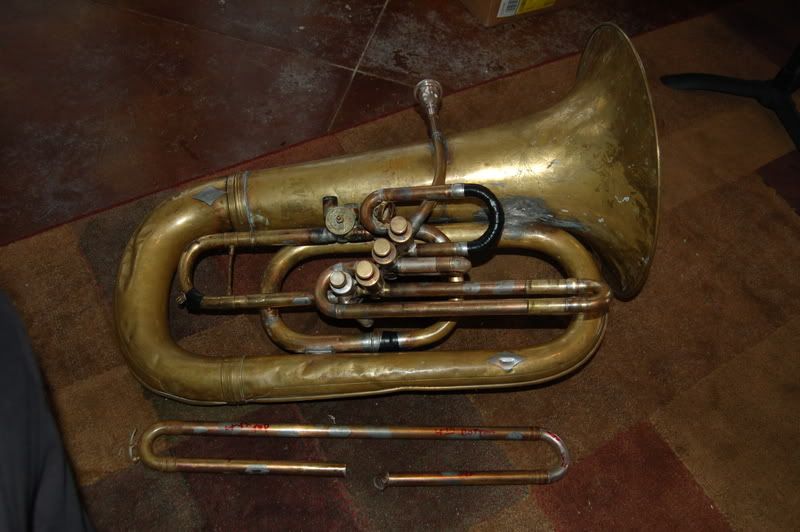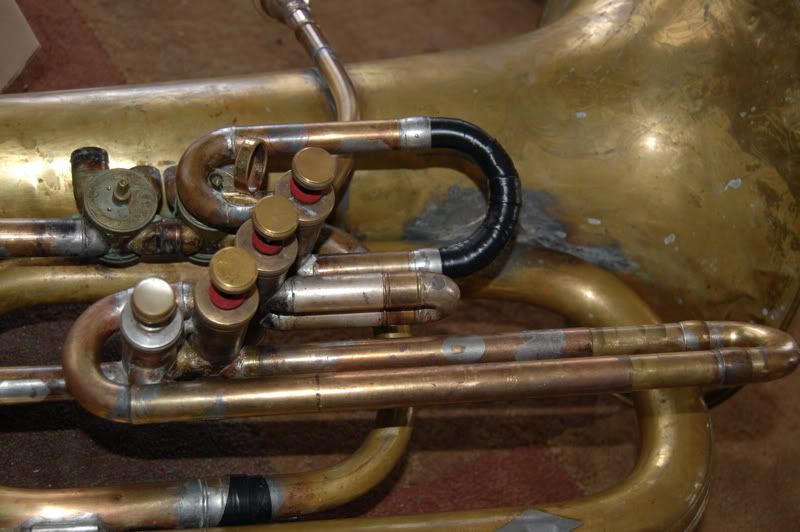Page 1 of 2
F tuba with personality
Posted: Mon Jan 21, 2008 8:37 pm
by markaustinhowle


These are pics of a project I've been having fun with. I took info given below and came up with good valve tubing lengths by play testing with a tuner and trimming pipe.
(from original post:)
Does anyone have the measurements for the length of pipe for valves 1-4 on an F tuba? This info may have already been posted previously but I don’t know how to search.

This was originally a top action Eb tuba, but when I put this newly rebuilt front action valve set onto the tuba it caused it, (with the much shorter lead pipe) to be in the key of F. The new lead pipe’s length was set when I cut each end of it to match the bore of the valve block and the mouthpiece receiver.[/img]
Posted: Mon Jan 21, 2008 10:54 pm
by Dan Schultz
BBb Tuba 18 ft. open pipe
CC Tuba 16 ft. open pipe
F Tuba 12 ft. open pipe
Eb Tuba 13.5 ft. open pipe
Bb Euph/Tenor Trombone - 9 ft. open pipe
Bb trumpet/cornet - 4.5 ft. open pipe
You can take percentages of the above to determine how much to add or take off of the valve circuits. Example... if you are changing an Eb tuba to a BBb tuba... add 33% to the valve circuits. If you still have the Eb valve tubing around, you can cut about 12% from it and you'll have a good place to start. (right Bloke?).
Set up the 4th valve last. It will be about the same length of the total of #1 and #3.
Re: Length of valve tubing for F tuba
Posted: Mon Jan 21, 2008 11:03 pm
by Dean E
markaustinhowle wrote:Does anyone have the measurements for the length of pipe for valves 1-4 on an F tuba? . . . .
Art Hovey shows how to calculate the tubing length.
http://galvanizedjazz.com/tuba.html
When you're done with that project, I have a couple more to work on!

Posted: Mon Jan 21, 2008 11:34 pm
by markaustinhowle
Thanks for the info.
Does anyone have the simple length of tubing for each of the 4 valves in inches? I'd like to take those numbers and check them against the formulas given before I make any cuts.
Thanks!
Posted: Tue Jan 22, 2008 12:29 am
by The Big Ben
markaustinhowle wrote:Thanks for the info.
Does anyone have the simple length of tubing for each of the 4 valves in inches? I'd like to take those numbers and check them against the formulas given before I make any cuts.
Thanks!
The Excel spreadsheet on Art Hovey's site contains that information and you can also plug in your own values. Obviously, you will need Excel to use this sheet.
Posted: Tue Jan 22, 2008 12:41 am
by Dan Schultz
markaustinhowle wrote:Thanks for the info.
Does anyone have the simple length of tubing for each of the 4 valves in inches? I'd like to take those numbers and check them against the formulas given before I make any cuts.
Thanks!
You can use that spreadsheet to get an APPROXIMATE length for your valve circuits. It's not likely anyone will provide information for exact length. Keep in mind that horns are not designed from finite figures and what really makes a horn is the prototyping that goes into it. Start with your valve circuits a little longer than you think you'll need and trim until you get what you are looking for. Then... remove a little more so you don't run the risk of the horn being flat. You can always pull out a little. I often use brass crooks and pieces of garden hose to 'mock up' the straight sections. Use a tuner to determine where you are and cut the hose accordingly. When you have the length you need, measure it and duplicate it in brass. On an existing circuit that is flat and you want to trim it... check it with a tuner. If it's 10 cents flat, pull out until it's 20 cents flat, and then trim twice the length of exposed slide from the circuit. Just take material off a little at a time until you get what you want. You're just going to have to experiment.
Posted: Tue Jan 22, 2008 1:14 am
by markaustinhowle
TubaTinker wrote:
If you still have the Eb valve tubing around, you can cut about 12% from it and you'll have a good place to start.
I don't have exact lengths for the Eb tubing either because I cut it from a BBb valve section several years ago and don't remember the system I used.
When my son was home from school I measured the pipe from his 45-SLP I but lost the figures.
If I can get the total length breakdown for both Eb and F tubas then maybe I can check those figures by using the 12% rule you mentioned.
Thanks again for the info.
The Big Ben wrote:
The Excel spreadsheet on Art Hovey's site contains that information and you can also plug in your own values. Obviously, you will need Excel to use this sheet.
Unfortunately I don’t have Excel...
Posted: Tue Jan 22, 2008 2:35 am
by The Big Ben
markaustinhowle wrote:The Big Ben wrote:t;]
The Excel spreadsheet on Art Hovey's site contains that information and you can also plug in your own values. Obviously, you will need Excel to use this sheet.
Unfortunately I don’t have Excel...
There is an open source application called Open Office which has versions for Windows and Mac (and Linux) and can be downloaded for free. Use Google to find it. It will read Excel files (as well as Word and Power Point). I use a verson of it which runs on the Mac and it works well.
Posted: Tue Jan 22, 2008 12:48 pm
by Dan Schultz
markaustinhowle wrote: Unfortunately I don’t have Excel...
If you make the circuits about these lengths, it will give you some place to start. These are probably too long and will have to be cut until you get the desired pitch. Measure from the piston casing along the straight tubing and through the centerline of the crook.... and back to the casing.
Eb
1st valve - 20"
2nd valve - 9 1/2"
3rd valve - 29 1/2"
4th valve - 52"
F
1st valve - 18"
2nd valve - 8"
3rd valve - 27"
4th valve - 48"
I still suggest that you use a couple of pieces of garden hose and a crook to get the approximate lengths before cutting any brass.
Posted: Tue Jan 22, 2008 2:40 pm
by jacojdm
The Big Ben wrote:markaustinhowle wrote:The Big Ben wrote:t;]
The Excel spreadsheet on Art Hovey's site contains that information and you can also plug in your own values. Obviously, you will need Excel to use this sheet.
Unfortunately I don’t have Excel...
There is an open source application called Open Office which has versions for Windows and Mac (and Linux) and can be downloaded for free. Use Google to find it. It will read Excel files (as well as Word and Power Point). I use a verson of it which runs on the Mac and it works well.
You can also open Excel files with Google Docs. It requires no downloading.
Linky
Posted: Sat Apr 05, 2008 1:40 pm
by markaustinhowle
I just updated the post with new pics and comments at the top.
The original 3 valve section came from a sousaphone and a York valve was added as the 4th. The valve block was replated and honed at Anderson's. There are two rotors under the thumb ring that came from a Miraphone 184. The tuba plays well, gets a good sound and has a good scale. So far, I am having to finger the A at the top of the staff 1&2.
Obviously there is a lot of work to do. After I complete the design work I will try to find a legitimate repair technician who will remove the dents and clean it up.
Posted: Sat Apr 05, 2008 2:56 pm
by cjk
Are you going to rework it so you can actually take the rotors apart?
Posted: Sat Apr 05, 2008 3:39 pm
by markaustinhowle
cjk wrote:Are you going to rework it so you can actually take the rotors apart?
I'll have to take the rotors apart in order to flip one of them. Right now the two are stuck together so there are just "there". Flipping one over should make room for linkage and tubing for both valves.
Posted: Sat Apr 05, 2008 7:32 pm
by markaustinhowle
Now that you mention it Wade it does read that way don't it?

Well yes, it looks like it will be close for sure, but I think I will have access for removal of the rotors after it is completed. There is a need to rotate the valve block counter clock-wise about 15 degrees or so to make all the pipes parallel. Doing that will create more space between parts.
Posted: Sat Apr 05, 2008 7:36 pm
by SplatterTone
Just pretend your are building an American car so you to remove a minimum of five parts to get to the intended part. And at least two of the parts will require a special tool.
Posted: Sat Apr 05, 2008 10:41 pm
by MikeMason
So, has anyone done any thinking/research into finding a formulaic and repeatable process to turn an old American Eb into a modern,functional f?Such as what Mr. Gnagey does with the King/York CC's.With the way our currency is,it seems a 4-7k 5valve f would really be in demand...
Posted: Thu Apr 10, 2008 12:49 am
by markaustinhowle
the elephant wrote:
What is the original horn brand and model? How old?
I forgot to answer your question Wade. I don't know who made it. There is a real nice ornate flowery engraving on the bell but no brand name. I think the tuba was made in the Czech Republic and the valves were made in Italy. No brand on the valves either. (The rotors are Miraphone.)
I don't know how to even start to figure out how old it is. The valve section came from a sousaphone that was painted pink and hung on the outside wall of a music store in Memphis for several years. (They were just replated and honed at Anderson's so they are like new now.) I bought the tuba on ebay 3 years ago from a guy in Rhode Island.
(It is the same bore size as the York Monster Eb.)
It is a small tuba. The total height is 30 inches and the bell is 16 inches.
Right now it serves as a learning tuba for my 16 year old son. He is discovering how much easier some things are to play on F compared to Eb tuba. We have a big Monster Eb York and this thing is much, much smaller.


